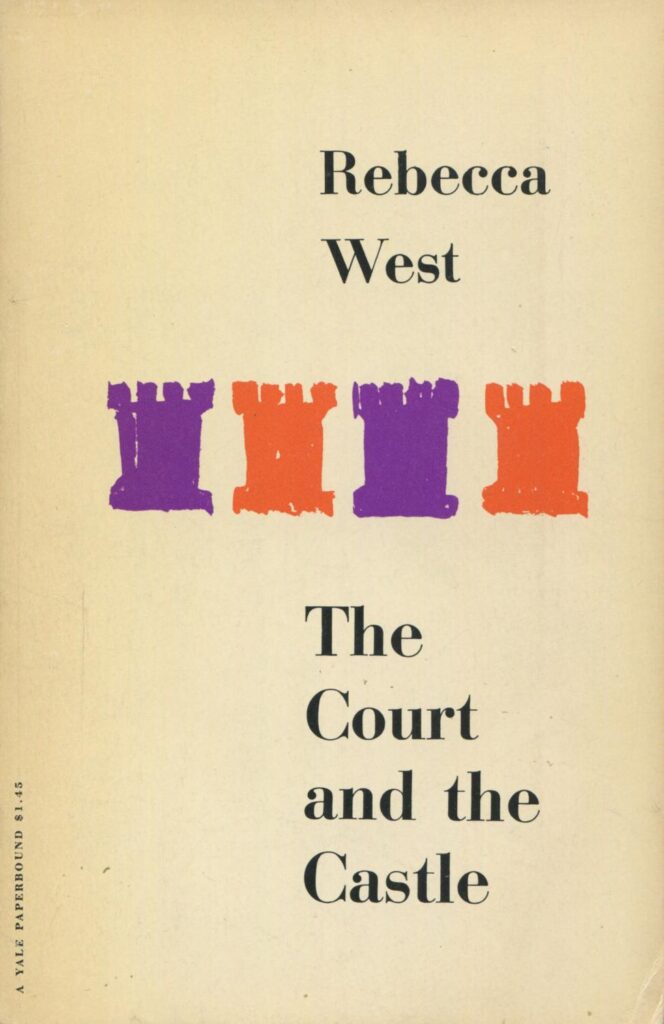

I’m a great fan of Rebecca West’s Black Lamb and Grey Falcon. But West was also a Deep Thinker when it came to Literature. In The Court and the Castle (1957) West tackles a number of literary topics. The main one–which would interest Dan Stumpf–deals with the “problems” in Hamlet.
West makes it clear she considers Hamlet a stone-cold killer. Hamlet kills Polonius (it was an accident, but Hamlet shows little remorse) and later in the play forges a letter that will send Rosencrantz and Guildenstern to their deaths. But Hamlet’s mission to kill Claudius–the man who murdered Hamlet’s father–faces delay after delay.
Rebecca West moves on to analyze Jane Austen, the Brontes, Henry Fielding, Thackeray, Henry James, Anthony Trollope, Ibsen, Meredith, Shaw, Wells, Galsworthy, and Hardy in Part Two.
Part Three transitions from Henry James to Kipling, Lawrence, Proust, and Kafka. I was impressed by the variety of West’s reading and her original insights into the works and writers she examines. If you’re looking for wide-ranging and lucid essays that bring sensibility and a skeptical temperament to literature, The Court and the Castle provides graceful and gracious entertainment to tickle your brain! GRADE: A–
TABLE OF CONTENTS:
PART ONE: THE COURT OF KINGS — 1
- Was Hamlet without Will? — 3
- The Nature of Will — 18
- The Will of Kings — 33
- The Will of Usurpers — 43
- The Unresolved Historical Argument — 59
- The Resolved Theological Argument — 68
- The Moral Reason for Misreading Hamlet — 72
- The Historical Reason for Misreading Hamlet — 89
PART TWO: THE CROWED COURT — 85
- The Great Optimist — 87
- Optimism and Comprise — 103
- A Nineteenth-Century Bureaucrat — 133
- The Convention of Dissent — 165
PART THREE: THE CASTLE OF GOD — 201
- Nonconformist Assenters and Independent Introverts — 203
- Loose Metaphysician and Strict Moralist — 224
- The Dissolution of the Court — 247
- The Twentieth-Century Bureaucrat — 279
INDEX — 309
I’ve liked what I’ve read of West and will read more of her…though the menu of writers she tackles here isn’t Too surprising, as they reflect the already Established Canon and some of the younger crowd getting a fair amount of attention, none more than H. G. Wells and their son Anthony West who came out of that attention. And I came to similar conclusions about Hamlet before being aware of her critique…gave a high-school paper on the play the title “The Mournful Child”. (My teacher wanted a much more sympathetic response to the character.)
And what slightly dampened the A?
Todd, in my humble opinion, THE COURT AND THE CASTLE’s reach exceeds its grasp. I think West tried to cover too much literary ground. The best parts of THE COURT AND THE CASTLE are those that deal with HAMLET.
Todd, I’ve been impressed with everything I’ve read of Rebecca West. A very underrated writer!
You’ve caught me, George. I’m actually embarrassed by how little I’ve read by West. Not that this is a valid excuse, my library has very little of her work.
Michael, you’re right. West is under-represented in most Libraries. If you’d like me to send you some duplicate West books, I’d be happy to. In the case of THE COURT AND THE CASTLE, the Buffalo Central Library had a copy in their Closed Stacks. I had to “influence” a librarian with chocolate candy to get that copy from 1957 sent to me for a few days. Well worth it!
Thanks for bringing this to my attention — along with a box of much-appreciated Goodies!
Dan, glad the SUMMER Goodies Box arrived safe and sound. That should keep you out of trouble for awhile!
A name you heard often thirty years ago.
Patti, I read Rebecca West in the 1970s and hoped she’d have a wider audience.
I’ve always meant to read more of hers, but I really only know her from BLACK LAMB AND GREY FALCON and her affair with H. G. Wells.
Jeff, apparently West’s relationship with H. G. Well didn’t go well.
George, have a safe trip to Ohio and enjoy the wedding!
Jeff, we made it to Ohio with just a little bit of rain shower action. The wedding is tomorrow and we’ll be heading for home on Monday. We’re eating pizza tonight!
Never heard of her! Looks like they went all out on that dazzling cover!
Bob, this edition of THE COURT AND THE CASTLE was published by Yale University Press in 1957. University presses at that time didn’t spend a lot of money on cover artwork.